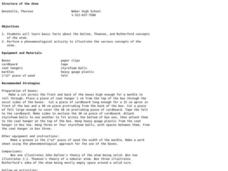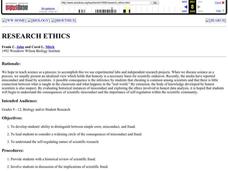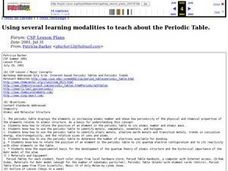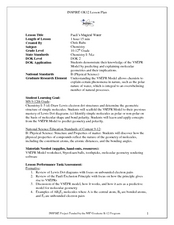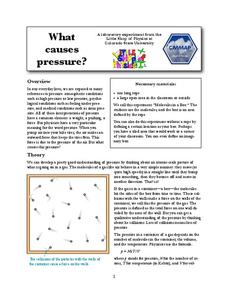Curated OER
History of Atomic Theory
Students study the significance of the quantum model and how scientific theories adapt over time. In this investigative lesson students describe the contributions that scientists have helped develop the atomic theory and identify...
Curated OER
Relative Masses
Students investigate relative mass using 8 different items. In this relative masses lesson plan, students discuss as a class John Dalton's atomic theory. They take the masses of the 8 items and record their data. They discuss relative...
Curated OER
Structure of the Atom
Students observe 3 models that show Dalton, Thomson and Rutherford's theories of the structure of the atom. In this structure of the atom lesson plan, students observe each model and write a summary of each theory of the atom.
Curated OER
Mystery : Structure of the Atom-A Case for Indirect Evidence
Students investigate the structure of the atom through hands on activities. In this atomic structure lesson, students perform 4 activities showing indirect evidence of the structure of the atom and the parts of the atom. They also list...
Curated OER
The Nature of Matter
Students compare and contrast how the theory of atomic structure has changed over time. They explore how different people have contributed to our knowledge of the atom and its structure. Students identify how matter is made of discrete...
Curated OER
Ionic bonding
Students explore ionic bonding. They draw examples of ionic bonding and explain the activities of the electrons of the elements. Students use paper plates and candy to draw electron configurations of given atoms.
Curated OER
Theoretical Quantum Physics... For Kids!
Learners explore quantum physics by participating in several class activities. In this space-time lesson, students discuss the concepts of time traveling and the anatomy of an atom. Learners draw geometric figures and utilize string to...
Virginia Department of Education
Elements and Electron Configuration
It's electronic! Pupils uncover elements and their electron configurations as they explore mass, groupings, correct charges, and sliding theory. Young scientists learn creative ways to remember various elements and correctly...
Curated OER
Research Ethics
Students develop an ability to distinguish between simple error, misconduct and fraud. Students are lead to consider a widening circle of the consequences of misconduct and fraud. They expand their knowledge on the self-regulating...
Curated OER
States of Matter
Students explore the states of matter. They discuss the different phrases of matter and categorize everyday substances as solids, liquids, or gases. Students explore the relationship between the phases on an atomic level and the role of...
Curated OER
Using several learning modalities to teach about the Periodic Table.
Students identify how to relate the position of an element in the periodic table to its atomic number and atomic mass. They identify how to use the periodic table to identify metals, semimetals, nonmetals, and halogens, and also,...
Curated OER
Pauli's Magical Water
Students predict the shape of molecules using VSEPR theory. In this chemistry lesson, students differentiate a polar and nonpolar molecule. They discuss why water's polarity is very important.
Chymist
Empirical Formula of a Compound
Because of the work of John Dalton, we are able to write formulas for compounds. The hands-on experiment has scholars prepare a compound from its elements. Using mass data, individuals write the empirical formula for the compound.
Curated OER
The Motion of Molecules in Water
Students observe the motion of water molecules using food coloring. In this molecule movement lesson plan, students observe motion in hot, cold and room temperature colored water and record observation data on record sheets. Then write a...
Colorado State University
What Causes Pressure?
Are you feeling the pressure? Let loose a little with a kinesthetic activity that models molecular motion in a closed space! The activity varies conditions such as volume and temperature and examines the effects on molecules.
Colorado State University
Why Can Warm Air "Hold" More Moisture than Cold Air?—Vapor Pressure Exercise
Does it feel a little humid in here? Learners assume the role of water vapor in the atmosphere as they explore the differences between warm and cold air. They roll dice to determine their level of energy, which determines if they...
Curated OER
Applied Science - Physics Pre-Lab
Students describe the science of physics. In this Physics lesson, students observe examples of physics within their classroom. Students create a definition for physics.
Curated OER
Beads, Balls, and Beakers
Students analyze the amount of space required to pack round objects. In this geometry lesson, students practice using space economically by practicing packing spheres into beakers. They then translate this concept to molecules being...
Curated OER
Extraction of DNA from White Onion
Learners conduct lab test with minced onion to determine where chromosonal DNA is located within the cell, and whether or not it can be extracted.
Curated OER
Colored H2 Balloon Explosions
Learners perform an experiment in which they put different types of salts in a balloon, fill it with hydrogen gas, and ignite it. The electrons in the salt molecules are excited by the heat and release energy in the form of light. ...
Curated OER
Cell physiology and chemistry
Students design an experiment to discriminate between chemical diffusion, osmosis, facilitated diffusion and active transport through a membrane. Be specific about predictions and interpretations!
Curated OER
Changes of State
Students examine molecules and the changes in energy of a system. In this energy systems lesson students complete a lab activity and describe changes of state.
Curated OER
What Really Matters When it Comes to Sound?
Young scholars conduct experiments to learn about sound wave vibrations in objects and pitch. Students test how varying the volume of water in a vessel changes frequency and pitch.
Curated OER
Limiting Reagent
Students work in small groups with a small set of 8 nuts and 5 bolts to assemble into combinations of 1 nut: 1 bolt, and 2 nuts: 1 bolt. They explore the outcome and discuss. Then a student mixes two clear, colorless solutions together...
Other popular searches
- Modern Atomic Theory
- Modern Day Atomic Theory
- Atomic Theory Time Line
- History of Atomic Theory
- Atomic Theory Worksheet
- Atomic Theory of Matter
- The Atomic Theory
- Atomic Theory Lesson Plans
- John Dalton Atomic Theory
- Progression of Atomic Theory
- Dalton's Atomic Theory
- Atomic Theory Timeline


